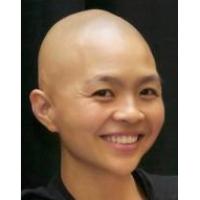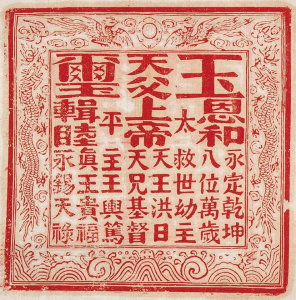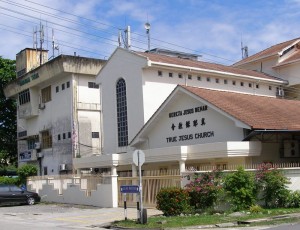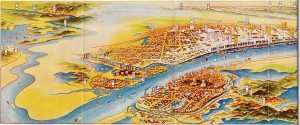Chinese, Christian, Global: Discussing Chinese Popular Histories with Dr. Melissa Wei-Tsing Inouye
The Republican Period (1911-1949) was an extremely important period for modern China. During this time, China was often politically divided, while there was no strong central government. Meanwhile, however, people in China enjoyed relative cultural, social, and religious freedom. Some people became Communists, while others converted into Christianity. Although China was generally seen as a weak and poor country by people in the West in the first half of twentieth century, some ordinary Chinese people grew increasingly aware of China's position in the world. Among them, Chinese Christians played important roles as they could act as bridges between people in China and the outside world. Chinese Christians became more aware of the global situation, since they often enjoyed international networks.
Scholars often study Chinese church leaders, and their institutional structure, but we know little about Chinese Christians' life experience at an everyday level. That's where the research of our latest featured scholar on the Global History Forum comes in. Based at the University of Auckland, Dr. Melissa Wei-Tsing Inouye seeks to enhance our understanding of social and cultural histories of China by studying Chinese ordinary people and in particular Chinese Christians in the first half of the twentieth century. Her research suggests that many Chinese Christians were increasingly aware of the global affairs and China's position in the world during this early twentieth century conjuncture. How, then, did Chinese converts view the place of the Chinese nation in the world? How did they perceive events like the Great War? Like the partial disintegration of European empires following that conflict? And how were the egalitarian ideals of Christianity reconcilable with a world that still spoke the language of "yellow perils" and which often limited the circulation of Chinese into the "white man's world" of European, North American, and Oceanian spaces?
These are some of the questions that Toynbee Prize Foundation Editor-at-Large Tiger Li discusses with Inouye in the interview that follows. In it, he discusses Inouye's initial road from her upbringing in Costa Mesa, California to her undergraduate education at Harvard College in Cambridge, Massachusetts, as well as her graduate studies at Harvard University, where she completed her dissertation in 2011, writing about the history of the True Jesus Church and the history of charismatic Christian modes in China in the twentieth century. You might not be familiar with the True Jesus Church, but as one of the largest Christian denominations in the People's Republic of China and Taiwan today (1.5 million members), it merits attention both as a matter of current affairs and intellectual history. Inspired by Pentecostalism, the True Jesus Church is also of interest for scholars of Christianity insofar as it forms the largest branch of Oneness Pentecostalism in the world. (In contrast to mainstream Christian doctrine, which stresses the trinitarian nature of Jesus Christ, God, and the Holy Spirit, churches like the True Jesus Church stress the indivisible nature of God and the idea that Jesus Christ is the sole manifestation of God's personhood.) Lest we move too far away from history to theology, however, let us jump into the conversation between Inouye and Li to learn how this movement fits into an emerging wave of scholarship on China in the world and transnational religious movements.
•
Tiger Li (TL): Professor Inouye, when did you start to get interested in Chinese history?
Melissa Inouye (MI): I started to get interested in Chinese history at Harvard College. I took a class by Professor Philip A. Kuhn on Chinese diasporas. And I remember that for the first time I learned that the majority of Chinese Americans came from just seven counties of Guangdong Province. I thought that this was fascinating. So I just wanted to learn more about China.
TL: Is this related to your personal identities as well?
MI: I think so. I took the class in the first place because I am Chinese-American. My grandfather and grandmother are actually Chinese-Americans, too; in fact, they were actually born in the United States. But my great-grandfather and great-grandmother were from Kaiping, Guangdong province. My parents did not speak Chinese to me at home. My mother just spoke English to me. That was the only language she knew. My grandmother could speak some Taishanhua (a southern Chinese dialect), but that was not her best language.
TL: So her (i.e. Inouye's grandmother) native language is also English?
MI: Right.
TL: When did you start to learn Chinese?
MI: I started to learn Chinese as a second year undergraduate student at Harvard College. But I was not very committed to learning back then. It was partly because I was also heavily involving as a member of the women's cross country team, so I was always very tired. But the summer after that, I went to Tsinghua University to study. It was an intensive language programme, and this is how I finally started to build a foundation for learning Chinese.
TL: How did you get interested in Chinese Christians in the twentieth century?
MI: OK. I first got interested in Chinese Christians when I was writing a college essay. It was a third year research paper on the Taiping Rebellion. Of course, the Taiping Rebellion is a massive historical event in nineteenth century Chinese history that is already well studied. But in doing my research essay, two things happened. First, I read a lot of Chinese Christian literature. For example, missionary writing was very interesting. The Western writing included what they were seeing in China, reporting the Taiping Movement (1850-1864). They documented the texts produced by and for the Taiping soldiers, the commanders, and the heavenly King, Hong Xiuquan (1814-1861), the founder of Taiping Heavenly Kingdom. Second, Harvard actually has an original copy of the tract that Hong Xiuquan first read. So it was just so exciting to see those actual documents. I just thought it was so interesting and amazing to be able to look at these original sources.
TL: So you start to get interested in nineteenth century Chinese Christians before you get interested in twentieth century Christians?
MI: That's right. I wrote my senior thesis on comparing the cultural strategies of Jesuits in China and Mormon missionaries in Taiwan. Despite huge differences in time, place, and institutional culture, the texts were intriguingly similar. Both organizations of missionaries struggled trying to understand local culture, trying to make their Christian teaching more appealing to local people. The process of adapting what they understood as the core elements of Christianity to a Chinese context forced them to rethink what was Christianity in the first place. I thought that this mutual process of translation and exchange on life's profound realities between Western churches and ordinary Chinese was so interesting.
TL: For readers in New Zealand, does "senior year" in the United States mean your Honours/Masters year in New Zealand?
MI: That's right, a New Zealand student would call it a postgraduate year, like an Honours or Masters student.
TL: What roles did Chinese Christians play in Sino-Western relations in the nineteenth and twentieth century?
MI: That is very rich question, because there are so many different types of Chinese Christians. We can talk about the Taipings and many other groups of people. So I'll just talk about the Protestants at the turn of the twentieth century, which is the time period in which I work. They were creating Chinese Christian publications and vast national and international networks of distribution. Sometimes they were edited by Western missionaries, but as they moved further and further in the twentieth century, they were edited by more and more Chinese editors.
A good example here is the periodical Chinese Christians and Intelligence – in Chinese, it is called 通問報 (Tongwenbao) – which was based in Shanghai and published nationally. In the early twentieth century, it included telegraph dispatches with international news and the reports of the latest scientific discoveries. It also included advertisements, such as trans-Pacific oceanliner fares and anti-blemish creams. These early Chinese Christian publications were reaching readers not only in major cities, but also in small villages and towns all across China. In other words, Chinese Christians from very early on were involved in global networking, advertising, and exchange, and not just in big cities. So I think of this as grassroots globalisation in China. The Christian publications not only taught about God, but were also instrumental in educating Chinese people about the world in which they lived. I find this all fascinating!
TL: What contribution does your research make to our understandings of China?
MI: Well, currently we have had a lot of work on Chinese intellectuals and other members of élite society. These people were aware of global affairs, were increasingly aware of China's position in the world, its place with other nations. But we still do not know enough about ordinary Chinese people, and their understandings of China's place in the global world. I think that common people in China were increasingly aware of China's global position in the early twentieth century, and this is very interesting.
TL: Do you see that people in the Republic of China had freedom of choice in terms of what they chose to believe? As we know, there was no strong united central government in China at that time.
MI: I think that is definitely true. It was not only just religions. Community groups formed and then expanded all over China in a very organic and natural manner. They did have to register with the government and required approval to establish themselves in places like Beijing. Hence, we cannot say there was no state control at all. But there was not as much as there is today. The state's ability to monitor the churches and compel them to accept regulations was not as strong as today, either.
TL: Do you see Wei Enbo as an ordinary person or elite, or both?
MI: OK. So here you are asking about Wei Enbo (1877-1911), the founder of the True Jesus Church. He founded the True Jesus Church, a Pentecostal church, in Beijing in 1917. I see Wei Enbo as an ordinary person. He was not a member of social elite, and his parents were both peasants. He was not from a gentry family. He was not a successful businessman until he became a Christian. But he was very aware of what was going on in the world. After he founded this new religious movement, one of the first things he did was to issue a church newsletter, called The Call of the Eastern Angel. This was a warning to the so-called Christian nations of the West. He argued that the Europeans were not acting as proper Christians, because they were fighting against each other during World War I. But in Wei's eyes, the church that renounced nationalism was the true Christianity.
TL: So Wei thought that Christians in the West were not true Christians?
MI: That's right. He said: "how can you call yourself Christians when you are blowing each other up and shedding each others' blood during the Great War?" He also said in another one of his papers that nationalism was a tool of the devil. So Wei was really thinking beyond the national boundary—the political space of a country. He was thinking globally. I think many Chinese Christians were like Wei, and they viewed the world globally. This was Christian universalist thinking.
TL: Then this became a global or transnational history?
MI: I hope so!
TL: Do you see yourself as a scholar of China or a scholar of China in a more transnational scale? How do you define yourself as a historian?
MI: I see myself as someone who studies the history of China. But for centuries, Chinese history has not just been what was going on within the physical or political borders of the Chinese state. Thus, to a certain extent, Chinese history has always been transnational history, especially if you look the history of Chinese diasporas, the histories of Chinese merchants and overseas communities in Southeast Asia, and, more recently, Chinese immigrants in places like California, New York, and New Zealand.
TL: What do you think about global and transnational history as an approach in general?
MI: I think it is very important. In the twenty-first century, we realise more and more that our lives are not just lived within the political boundaries of our respective nation-states. On a global scale, what we do affects other people, and, conversely, what other people do affects us. It has huge implications not just for how we understand ourselves, not just for our identity, but also for the moral choices that we make. I think that is very important.
TL: What do you mean by "moral choices"? We should not have war?
MI: That's part of it. It's a lot bigger than that in terms of understanding how our individual actions collectively shape the lives of others in the world.
TL: What roles do you think Chinese Christians may play in terms of promoting peace in China, as well as world peace?
MI: I think that the job of historians is talking about humans being humans. History is a subject of the humanities. We learn about other humans, and what it means to live in a meaningful life, or to be part of human community. I think that is what history is about: being part of the human community. Chinese Christians can also help to promote peace. I think when we become confused about the meaning of life and the meaning of community, we are more likely to take violent actions against others. When we dehumanise people, it is easier to not think of others' interests.
TL: My next question is about gender. What roles did female Chinese Christians play in the first half of the twentieth century?
MI: That's a great question! If you look the formal institutions of Chinese Christians, you mostly see men, and so you might assume that men had a monopoly on ecclesiastical power. But if you look at informal institutions that hold the everyday practices and the community services of Chinese Christian congregations, you mostly see women. These women were going to people's houses, and praying for others, or making food, or bring congregations together for a festival. Women were also often the recipients of healing miracles. So in this sense, women played huge role in creating the Chinese Christian community. Women were heavily involved in shaping cultural values and everyday religious practices.
Now, I think the formal institutional structure is more easily recorded on paper, and, therefore, stored in archives. But in newspaper reports, or biographies that published by certain people, you do get a glance of women's lives. They were extremely involved in creating the life of the church. In that sense, women shaped the lives, experiences, and aspirations of the entire congregation, which is very significant. And you can still see this today. Women are extremely active in contemporary Chinese churches, especially in the daily activities.
TL: So in other words, there were not many Chinese female Christian leaders in the first half of twentieth century? Can one say that?
MI: Well, there were a few. For example, in the True Jesus Church, you have elders, you have Chuandao (similar to missionaries), and many of these roles were performed by women. But at the highest level, they were all men. At the lower local level, women played a very active role, such as healing people, helping people, telling people stories about churches.
TL: Are these also the gaps in the scholarship that you want to fill?
MI: That's right. I think that existing scholarship focuses more on institutional expression of Christianity in China. I am trying to study the everyday life of Christianity, including how individual people created and gave life to those institutions. It naturally takes us to the domain of men and women.
TL: I know you are trying to turn your dissertation into a book. Do you have a deadline for your publication?
MI: I aim to complete it by May 2016. Who knows when it'll eventually be published after then!
TL: How did you find your interesting Chinese primary sources? What do your sources mean when you are planning your project?
MI: I found my sources in a number of ways. Most of them are archival materials or periodicals from the Republican era (1911-1949). But the True Jesus Church also has what's called a thirtieth anniversary publication that is a compilation of documents and histories pertaining to church history up to that point. So I used those materials. I also went to Taiwan for research purposes. They held governmental reports. I went to Wuhan (a major city located in central China). Their archives have the churches' records in the 1950s. I went to Nanjing (a major city located west of Shanghai) to find primary sources as well. I found some important reports of the True Jesus Church in the archives in Wuhan and Nanjing. And I'm sure there are many more materials in other provincial and city archives around China. It was just that the leadership of the church were based in Nanjing and Wuhan during the Republican era. So that is why I went there to find my primary sources.
TL: What are the challenges you face as you are trying to turn your PhD dissertation into your first book?
MI: Well, for me the challenge is time. I feel I do not have enough of the time that's required for creative thinking. It is hard to do creative work in a short, hurried bursts.
TL: Is this because you have to teach all the time? Or because you have your children at home?
MI: All of them, I think. I have to teach classes. I also have departmental responsibilities, including organising seminars and inviting scholars to deliver lectures at the University of Auckland. And of course, I have to look after my four young children.
TL: Who would be your audiences? Who would read your research?
MI: I want to speak to other scholars who do the history of Christianity in China, and, more generally, an audience of people who care about questions like: "How do you get a large number of people to do the right thing?" I see my current project, the history of the True Jesus Church, as an example of the tension between charismatic experience and institution-building in Chinese society. I hope to reach a larger audience. I would like for this book to be something that undergraduate students can use for their courses. It would be a history book which not only focuses on Chinese political history, but which also touches on the social and cultural histories of China. I think the social and cultural aspects of Chinese history are just as interesting and important as political history. They help us understand how Chinese people experienced the twentieth century. Not all Chinese people were top Chinese Communist Party members, or Chiang Kai-shek (1887-1975), or successful businessman.
TL: In other words, you hope your book become a textbook for your university students?
MI: That is my hope. I teach university classes. I am writing something that I would like my students to have access to.
TL: What is your next project after this one?
MI: My next project is on this group called Wanguo Daodehui (萬國道德會) [a Confucian society with a strong universalist and Chinese nationalist bent, founded in 1921]. They had a very interesting founder, called Jiang Xizhang (江希張). Again, I see this as another example of grassroots in early globalization in China. I am interested in how they placed Chinese Confucianism within the global context of philosophical of Christianity, Judaism, and Islam.
•
As we have seen in other Global History Forum interviews, all nations' histories are entangled in the history of other nations. That phenomenon, however, is perhaps especially visible in the case of China, which today as in the past remains bound up in networks of oceanic trade and global religious exchange. Since the re-entry of the People's Republic of China into the global economy since the late 1970s, moreover, those ties are only increasing – even if it also means increased international scrutiny over the place of Christian movements like the True Jesus Church.
What's clear from Inouye's research, however, is that Chinese intellectuals – Christians, Confucian reformers like those who feature in her next project, and the Communists who have both challenged and integrated aspects of those groups' thinking on China in the world – have been looking at their own nation's place in the world as much as the world has been seeking to integrate, or accommodate, the place of a resurgent China in the international order. We look forward to the results of her ongoing research, and thank her for participating in this installment of the Global History Forum.



